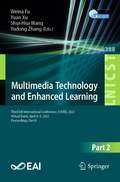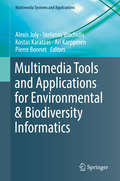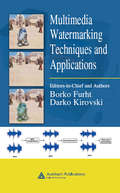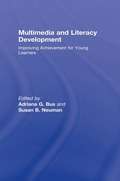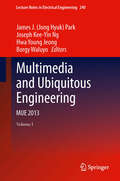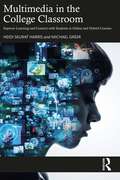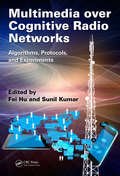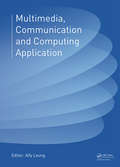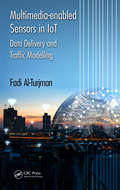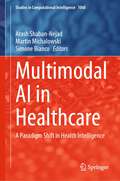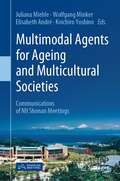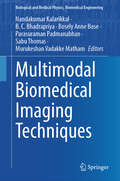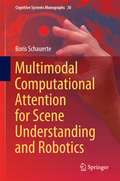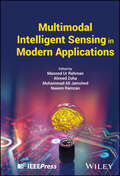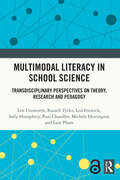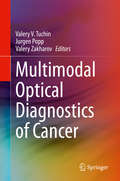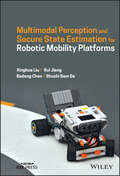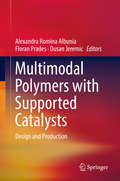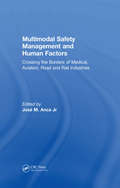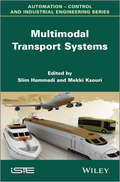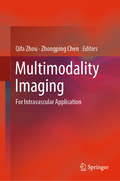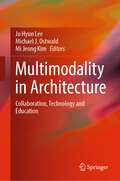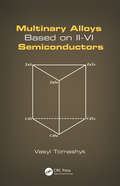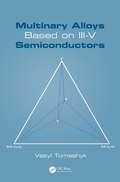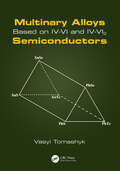- Table View
- List View
Multimedia Technology and Enhanced Learning: Third EAI International Conference, ICMTEL 2021, Virtual Event, April 8–9, 2021, Proceedings, Part II (Lecture Notes of the Institute for Computer Sciences, Social Informatics and Telecommunications Engineering #388)
by Yuan Xu Shui-Hua Wang Weina Fu Yudong ZhangThis two-volume book constitutes the refereed proceedings of the 3rd International Conference on Multimedia Technology and Enhanced Learning, ICMTEL 2021, held in April 2021. Due to the COVID-19 pandemic the conference was held virtually. The 97 revised full papers have been selected from 208 submissions. They describe new learning technologies which range from smart school, smart class and smart learning at home and which have been developed from new technologies such as machine learning, multimedia and Internet of Things.
Multimedia Tools and Applications for Environmental & Biodiversity Informatics (Multimedia Systems and Applications)
by Pierre Bonnet Stefanos Vrochidis Alexis Joly Kostas Karatzas Ari KarppinenThis edited volume focuses on the latest and most impactful advancements of multimedia data globally available for environmental and earth biodiversity. The data reflects the status, behavior, change as well as human interests and concerns which are increasingly crucial for understanding environmental issues and phenomena. This volume addresses the need for the development of advanced methods, techniques and tools for collecting, managing, analyzing, understanding and modeling environmental & biodiversity data, including the automated or collaborative species identification, the species distribution modeling and their environment, such as the air quality or the bio-acoustic monitoring. Researchers and practitioners in multimedia and environmental topics will find the chapters essential to their continued studies.
Multimedia Watermarking Techniques and Applications (Internet And Communications Ser.)
by Darko KirovskiIntellectual property owners must continually exploit new ways of reproducing, distributing, and marketing their products. However, the threat of piracy looms as a major problem with digital distribution and storage technologies. Multimedia Watermarking Techniques and Applications covers all current and future trends in the design of modern
Multimedia and Literacy Development: Improving Achievement for Young Learners
by Susan B. Neuman Adriana G. BusRepresenting the state of the art in multimedia applications and their promise for enhancing early literacy development, this volume broadens the field of reading research by looking beyond print-only experiences to young readers’ encounters with multimedia stories on the Internet and DVD. Multimedia storybooks include, in addition to static pictures and written text, features such as oral text, animations, sounds, zooms, and scaffolds designed to help convey meaning. These features are changing how young children read text, and also provide technology-based scaffolds for helping struggling readers. Multimedia and Literacy Development reports experimental research and practices with multimedia stories indicating that new dimensions of media contribute to young children’s ability to understand stories and to read texts independently. This is the first synthesis of evidence-based research in this field. Four key themes are highlighted: Understanding the multimedia environment for learning Designing multimedia applications for learning New approaches to storybook reading Multimedia applications in classroom instruction. Written in jargon-free language for an international audience of students in university courses on literacy and information technology, researchers, policymakers, program developers, and media specialists, this volume is essential reading for all professionals interested in early literacy and early interventions.
Multimedia and Ubiquitous Engineering
by James J. Park Hwa Young Jeong Borgy Waluyo Joseph Kee-Yin NgThe new multimedia standards (for example, MPEG-21) facilitate the seamless integration of multiple modalities into interoperable multimedia frameworks, transforming the way people work and interact with multimedia data. These key technologies and multimedia solutions interact and collaborate with each other in increasingly effective ways, contributing to the multimedia revolution and having a significant impact across a wide spectrum of consumer, business, healthcare, education, and governmental domains. Multimedia and Ubiquitous Engineering provides an opportunity for academic and industry professionals to discuss recent progress in the area of multimedia and ubiquitous environment including models and systems, new directions, novel applications associated with the utilization and acceptance of ubiquitous computing devices and systems.
Multimedia in the College Classroom: Improve Learning and Connect with Students in Online and Hybrid Courses
by Heidi Skurat Harris Michael GreerThis practical guide to multimedia in online college instruction provides easy-to-follow instructions for designing multimedia assignments that maximize student learning while reducing cognitive load.This book presents the learning process as a complex, multidimensional experience that includes texts as well as auditory and visual elements. Each chapter includes research-based activities to develop instructors’ multimedia skills. The book leverages cutting edge cognitive research to improve accessibility and design, while also providing practical asynchronous and synchronous activities that engage learners.Multimedia in the College Classroom is the ideal resource for any higher education instructor, administrator, or leader who wishes to learn about, reflect on, and implement research-based learning strategies through the targeted use of multimedia.
Multimedia over Cognitive Radio Networks: Algorithms, Protocols, and Experiments
by Sunil Kumar Fei HuWith nearly 7 billion mobile phone subscriptions worldwide, mobility and computing have become pervasive in our society and business. Moreover, new mobile multimedia communication services are challenging telecommunication operators. To support the significant increase in multimedia traffic-especially video-over wireless networks, new technological
Multimedia, Communication and Computing Application: Proceedings of the 2014 International Conference on Multimedia, Communication and Computing Application (MCCA 2014), Xiamen, China, October 16-17, 2014
by Ally Leung2014 International Conference on Multimedia, Communication and Computing Application (MCCA2014), Xiamen, China, Oct 16-17, 2014, provided a forum for experts and scholars of excellence from all over the world to present their latest work in the area of multimedia, communication and computing applications. In recent years, the multimedia techno
Multimedia-enabled Sensors in IoT: Data Delivery and Traffic Modelling
by Fadi Al-TurjmanThis book gives an overview of best effort data and real-time multipath routing protocols in WMSN. It provides results of recent research in design issues affecting the development of strategic multipath routing protocols that support multimedia data traffic in WMSN from an IoT perspective, plus detailed analysis on the appropriate traffic models.
Multimodal AI in Healthcare: A Paradigm Shift in Health Intelligence (Studies in Computational Intelligence #1060)
by Simone Bianco Arash Shaban-Nejad Martin MichalowskiThis book aims to highlight the latest achievements in the use of AI and multimodal artificial intelligence in biomedicine and healthcare. Multimodal AI is a relatively new concept in AI, in which different types of data (e.g. text, image, video, audio, and numerical data) are collected, integrated, and processed through a series of intelligence processing algorithms to improve performance. The edited volume contains selected papers presented at the 2022 Health Intelligence workshop and the associated Data Hackathon/Challenge, co-located with the Thirty-Sixth Association for the Advancement of Artificial Intelligence (AAAI) conference, and presents an overview of the issues, challenges, and potentials in the field, along with new research results. This book provides information for researchers, students, industry professionals, clinicians, and public health agencies interested in the applications of AI and Multimodal AI in public health and medicine.
Multimodal Agents for Ageing and Multicultural Societies: Communications of NII Shonan Meetings
by Wolfgang Minker Elisabeth André Juliana Miehle Koichiro YoshinoThis book aims to explore and discuss theories and technologies for the development of socially competent and culture-aware embodied conversational agents for elderly care. To tackle the challenges in ageing societies, this book was written by experts who have a background in assistive technologies for elderly care, culture-aware computing, multimodal dialogue, social robotics and synthetic agents. Chapter 1 presents a vision of an intelligent agent to illustrate the current challenges for the design and development of adaptive systems. Chapter 2 examines how notions of trust and empathy may be applied to human–robot interaction and how it can be used to create the next generation of emphatic agents, which address some of the pressing issues in multicultural ageing societies. Chapter 3 discusses multimodal machine learning as an approach to enable more effective and robust modelling technologies and to develop socially competent and culture-aware embodied conversational agents for elderly care. Chapter 4 explores the challenges associated with real-world field tests and deployments. Chapter 5 gives a short introduction to socio-cognitive language processing that describes the idea of coping with everyday language, irony, sarcasm, humor, paralinguistic information such as the physical and mental state and traits of the dialogue partner, and social aspects. This book grew out of the Shonan Meeting seminar entitled “Multimodal Agents for Ageing and Multicultural Societies” held in 2018 in Japan. Researchers and practitioners will be helped to understand the emerging field and the identification of promising approaches from a variety of disciplines such as human–computer interaction, artificial intelligence, modelling, and learning.
Multimodal Biomedical Imaging Techniques (Biological and Medical Physics, Biomedical Engineering)
by Sabu Thomas Parasuraman Padmanabhan Nandakumar Kalarikkal B. C. Bhadrapriya Bosely Anne Bose Murukeshan Vadakke MathamThis book highlights various aspects of multimodal imaging techniques. Innovations and progress in the field of advanced molecular imaging techniques such as Computed Tomography (CT), Magnetic Resonance Imaging (MRI), Positron Emission Tomography (PET), Single-Photon Emission Computed Tomography (SPECT), Fluorescence Imaging, Photoacoustic imaging(PAI), Fluorescence Molecular Tomography (FMT), Ultrasound (US), etc., are covered in this book. This book is an invaluable reference for students, professionals, and research scholars (primarily in the field of materials science, biomedical imaging, and nanoscience and nanotechnology) and also for those who want to nurture their scientific temper/skills in these areas.
Multimodal Computational Attention for Scene Understanding and Robotics
by Boris SchauerteThis book presents state-of-the-art computationalattention models that have been successfully tested in diverse applicationareas and can build the foundation for artificial systems to efficientlyexplore, analyze, and understand natural scenes. It gives a comprehensive overview of the most recentcomputational attention models for processing visual and acoustic input. Itcovers the biological background of visual and auditory attention, as well as bottom-up and top-down attentionalmechanisms and discusses various applications. In the first part new approachesfor bottom-up visual and acoustic saliency models are presented and applied tothe task of audio-visual scene exploration of a robot. In the second part theinfluence of top-down cues for attention modeling is investigated.
Multimodal Intelligent Sensing in Modern Applications
by Naeem Ramzan Masood Ur Rehman Ahmed Zoha Muhammad Ali JamshedDiscover the design, implementation, and analytical techniques for multi-modal intelligent sensing in this cutting-edge text The Internet of Things (IoT) is becoming ever more comprehensively integrated into everyday life. The intelligent systems that power smart technologies rely on increasingly sophisticated sensors in order to monitor inputs and respond dynamically. Multi-modal sensing offers enormous benefits for these technologies, but also comes with greater challenges; it has never been more essential to offer energy-efficient, reliable, interference-free sensing systems for use with the modern Internet of Things. Multimodal Intelligent Sensing in Modern Applications provides an introduction to systems which incorporate multiple sensors to produce situational awareness and process inputs. It is divided into three parts—physical design aspects, data acquisition and analysis techniques, and security and energy challenges—which together cover all the major topics in multi-modal sensing. The result is an indispensable volume for engineers and other professionals looking to design the smart devices of the future. Multimodal Intelligent Sensing in Modern Applications readers will also find: Contributions from multidisciplinary contributors in wireless communications, signal processing, and sensor design Coverage of both software and hardware solutions to sensing challenges Detailed treatment of advanced topics such as efficient deployment, data fusion, machine learning, and more Multimodal Intelligent Sensing in Modern Applications is ideal for experienced engineers and designers who need to apply their skills to Internet of Things and 5G/6G networks. It can also act as an introductory text for graduate researchers into understanding the background, design, and implementation of various sensor types and data analytics tools.
Multimodal Literacy in School Science: Transdisciplinary Perspectives on Theory, Research and Pedagogy
by Paul Chandler Russell Tytler Len Unsworth Sally Humphrey Lisl Fenwick Michele Herrington Lam PhamThis book establishes a new theoretical and practical framework for multimodal disciplinary literacy (MDL) fused with the subject-specific science pedagogies of senior high school biology, chemistry and physics. It builds a compatible alignment of multiple representation and representation construction approaches to science pedagogy with the social semiotic, systemic functional linguistic-based approaches to explicit teaching of disciplinary literacy. The early part of the book explicates the transdisciplinary negotiated theoretical underpinning of the MDL framework, followed by the research-informed repertoire of learning experiences that are then articulated into a comprehensive framework of options for the planning of classroom work. Practical adoption and adaptation of the framework in biology, chemistry and physics classrooms are detailed in separate chapters. The latter chapters indicate the impact of the collaborative research on teachers' professional learning and students’ multimodal disciplinary literacy engagement, concluding with proposals for accommodating emerging developments in MDL in an ever-changing digital communication world. The MDL framework is designed to enable teachers to develop all students' disciplinary literacy competencies. This book will be of interest to researchers, teacher educators and postgraduate students in the field of science education. It will also have appeal to those in literacy education and social semiotics.
Multimodal Optical Diagnostics of Cancer
by Valery V. Tuchin Jürgen Popp Valery ZakharovThis book provides an in-depth description and discussion of different multi-modal diagnostic techniques for cancer detection and treatment using exact optical methods, their comparison, and combination. Coverage includes detailed descriptions of modern state of design for novel methods of optical non-invasive cancer diagnostics; multi-modal methods for earlier cancer diagnostic enhancing the probability of effective cancer treatment; modern clinical trials with novel methods of clinical cancer diagnostics; medical and technical aspects of clinical cancer diagnostics, and long-term monitoring. Biomedical engineers, cancer researchers, and scientists will find the book to be an invaluable resource.Introduces optical imaging strategies;Focuses on multimodal optical diagnostics as a fundamental approach;Discusses novel methods of optical non-invasive cancer diagnostics.
Multimodal Perception and Secure State Estimation for Robotic Mobility Platforms
by Shuzhi Sam Ge Rui Jiang Xinghua Liu Badong ChenMultimodal Perception and Secure State Estimation for Robotic Mobility Platforms Enables readers to understand important new trends in multimodal perception for mobile robotics This book provides a novel perspective on secure state estimation and multimodal perception for robotic mobility platforms such as autonomous vehicles. It thoroughly evaluates filter-based secure dynamic pose estimation approaches for autonomous vehicles over multiple attack signals and shows that they outperform conventional Kalman filtered results. As a modern learning resource, it contains extensive simulative and experimental results that have been successfully implemented on various models and real platforms. To aid in reader comprehension, detailed and illustrative examples on algorithm implementation and performance evaluation are also presented. Written by four qualified authors in the field, sample topics covered in the book include: Secure state estimation that focuses on system robustness under cyber-attacks Multi-sensor fusion that helps improve system performance based on the complementary characteristics of different sensors A geometric pose estimation framework to incorporate measurements and constraints into a unified fusion scheme, which has been validated using public and self-collected data How to achieve real-time road-constrained and heading-assisted pose estimation This book will appeal to graduate-level students and professionals in the fields of ground vehicle pose estimation and perception who are looking for modern and updated insight into key concepts related to the field of robotic mobility platforms.
Multimodal Polymers with Supported Catalysts: Design And Production
by Alexandra Romina Albunia Floran Prades Dusan JeremicThis book provides an overview of polyolefine production, including several recent breakthrough innovations in the fields of catalysis, process technology, and materials design. The industrial development of polymers is an extraordinary example of multidisciplinary cooperation, involving experts from different fields. An understanding of structure-property and processing relationships leads to the design of materials with innovative performance profiles. A comprehensive description of the connection between innovative material performance and multimodal polymer design, which incorporates both flexibility and constraints of multimodal processes and catalyst needs, is provided. This book provides a summary of the polymerization process, from the atomistic level to the macroscale, process components, including catalysts, and their influence on final polymer performance. This reference merges academic research and industrial knowledge to fill the gaps between academic research and industrial processes.
Multimodal Safety Management and Human Factors: Crossing the Borders of Medical, Aviation, Road and Rail Industries
by José M. JrSafety management and human factors disciplines are often regarded as subjective and nebulous. This perhaps stems from a variety of, sometimes disparate, activities in the realms of education, industry and research. Aviation is one of the safety-critical industries that has led the development of safety systems and human factors. However, in recent years, safety management and human factors are seen to be progressing well in the road, rail and the medical arena. Multimodal Safety Management and Human Factors is a wide-ranging compendium of contemporary approaches in the aviation, road, rail and medical domains. It brings together 28 chapters from both the academic and professional worlds that focus on applications, tools and strategies in safety management and human factors. It is a wellspring of the practical rather than the theoretical. Safety scientists, human factors industry practitioners, change management advocates, educators and students will find this book extremely relevant and challenging.
Multimodal Transport Systems
by Slim Hammadi Mekki KsouriThe use and management of multimodal transport systems, including car-pooling and goods transportation, have become extremely complex, due to their large size (sometimes several thousand variables), the nature of their dynamic relationships as well as the many constraints to which they are subjected. The managers of these systems must ensure that the system works as efficiently as possible by managing the various causes of malfunction of the transport system (vehicle breakdowns, road obstructions, accidents, etc.). The detection and resolution of conflicts, which are particularly complex and must be dealt with in real time, are currently processed manually by operators. However, the experience and abilities of these operators are no longer sufficient when faced with the complexity of the problems to be solved. It is thus necessary to provide them with an interactive tool to help with the management of disturbances, enabling them to identify the different disturbances, to characterize and prioritize these disturbances, to process them by taking into account their specifics and to evaluate the impact of the decisions in real time. Each chapter of this book can be broken down into an approach for solving a transport problem in 3 stages, i.e. modeling the problem, creating optimization algorithms and validating the solutions. The management of a transport system calls for knowledge of a variety of theories (problem modeling tools, multi-objective problem classification, optimization algorithms, etc.). The different constraints increase its complexity drastically and thus require a model that represents as far as possible all the components of a problem in order to better identify it and propose corresponding solutions. These solutions are then evaluated according to the criteria of the transport providers as well as those of the city transport authorities. This book consists of a state of the art on innovative transport systems as well as the possibility of coordinating with the current public transport system and the authors clearly illustrate this coordination within the framework of an intelligent transport system. Contents 1. Dynamic Car-pooling, Slim Hammadi and Nawel Zangar. 2. Simulation of Urban Transport Systems, Christian Tahon, Thérèse Bonte and Alain Gibaud. 3. Real-time Fleet Management: Typology and Methods, Frédéric Semet and Gilles Goncalves. 4. Solving the Problem of Dynamic Routes by Particle Swarm, Mostefa Redouane Khouahjia, Laetitia Jourdan and El Ghazali Talbi. 5. Optimization of Traffic at a Railway Junction: Scheduling Approaches Based on Timed Petri Nets, Thomas Bourdeaud’huy and Benoît Trouillet. About the Authors Slim Hammadi is Full Professor at the Ecole Centrale de Lille in France, and Director of the LAGIS Team on Optimization of Logistic systems. He is an IEEE Senior Member and specializes in distributed optimization, multi-agent systems, supply chain management and metaheuristics. Mekki Ksouri is Professor and Head of the Systems Analysis, Conception and Control Laboratory at Tunis El Manar University, National Engineering School of Tunis (ENIT) in Tunisia. He is an IEEE Senior Member and specializes in control systems, nonlinear systems, adaptive control and optimization. The multimodal transport network customers need to be oriented during their travels. A multimodal information system (MIS) can provide customers with a travel support tool, allowing them to express their demands and providing them with the appropriate responses in order to improve their travel conditions. This book develops methodologies in order to realize a MIS tool capable of ensuring the availability of permanent multimodal information for customers before and while traveling, considering passengers mobility.
Multimodality Imaging: For Intravascular Application
by Zhongping Chen Qifa ZhouThis book provides a state-of-the-art overview of the combined use of imaging modalities to obtain important functional and morphological information on intravascular disease and enhance disease detection. It discusses the integration of intravascular ultrasound (IVUS, intravascular optical coherence tomography (OCT), intravascular photoacoustic imaging (IVPA) and acoustic radiation force optical coherence elastography (ARF-OCE), and introduces the integration of multimodality imaging systems, such as IR and florescence. It includes the latest research advances and numerous imaging photos to offer readers insights into current intravascular applications. It is a valuable resource for students, scientists and physicians wanting to gain a deeper understanding of multimodality imaging tools.
Multimodality in Architecture: Collaboration, Technology and Education
by Michael J. Ostwald Ju Hyun Lee Mi Jeong KimThis book examines multimodality in architecture and its impacts on collaborative, technical and educational processes or systems. Multimodality is becoming increasingly critical in contemporary architectural practice and education. Creative design teams face new challenges when they embrace new modes of communication, technology, and knowledge development processes. From diverse online modes of communication to shared digital environments, generative AI and advanced hardware solutions, new modes of information creation, sharing, and application are changing the ways architects and designers work.The book presents new research which empowers international researchers and designers to work more effectively in a diverse range of digital environments.Whether the readers are architects, teachers, students, or scholars, this book provides critical insights and practical tools for understanding and optimising processes in architecture and design.
Multinary Alloys Based on II-VI Semiconductors
by Vasyl TomashykA companion volume to Ternary Alloys Based on II-VI Semiconductor Compounds (CRC Press, 2013) and Quaternary Alloys Based on II-VI Semiconductor Compounds (CRC Press, 2014), Multinary Alloys Based on II-VI Semiconductors provides up-to-date experimental and theoretical information on phase relations based on II-VI semiconductor systems with five or
Multinary Alloys Based on III-V Semiconductors
by Vasyl TomashykIII-V semiconductors have attracted considerable attention due to their applications in the fabrication of electronic and optoelectronic devices as light emitting diodes and solar cells. The electrical properties of these semiconductors can also be tuned by adding impurity atoms. Because of their wide application in various devices, the search for new semiconductor materials and the improvement of existing materials is an important field of study. This book covers all known information about phase relations in multinary systems based on III-V semiconductors, providing the first systematic account of phase equilibria in multinary systems based on III-V semiconductors and making research originally published in Russian accessible to the wider scientific community. This book will be of interest to undergraduate and graduate students studying materials science, solid state chemistry, and engineering. It will also be relevant for researchers at industrial and national laboratories, in addition to phase diagram researchers, inorganic chemists, and solid state physicists. Features: Provides up-to-date experimental and theoretical information Allows readers to synthesize semiconducting materials with predetermined properties Delivers a critical evaluation of many industrially important systems presented in the form of two-dimensional sections for the condensed phases
Multinary Alloys Based on IV-VI and IV-VI2 Semiconductors
by Vasyl TomashykIV-VI and IV-VI2 semiconductors have attracted considerable attention due to their applications in the fabrication of electronic and optoelectronic devices as infrared lasers and detectors. The electrical properties of these semiconductors can also be tuned by adding impurity atoms. Because of their wide application in various devices, the search for new semiconductor materials and the improvement of existing materials is an important field of study. Doping with impurities is a common method of modifying and diversifying the properties of physical and chemical semiconductors. This book covers all known information about the phase relations in multinary systems based on IV-VI and IV-VI2 semiconductors, providing the first systematic account of phase equilibria in multinary systems based on IV-VI and IV-VI2 semiconductors and making research originally published in Ukrainian and Russian accessible to the wider scientific community. This book will be of interest to undergraduate and graduate students studying materials science, solid state chemistry, and engineering. It will also be relevant for researchers at industrial and national laboratories, in addition to researchers of phase equilibria, inorganic chemists, and solid state physicists.Key Features: Provides up-to-date experimental and theoretical information Allows readers to synthesize semiconducting materials with predetermined properties Delivers a critical evaluation of many industrially important systems presented in the form of two-dimensional sections for the condensed phases
